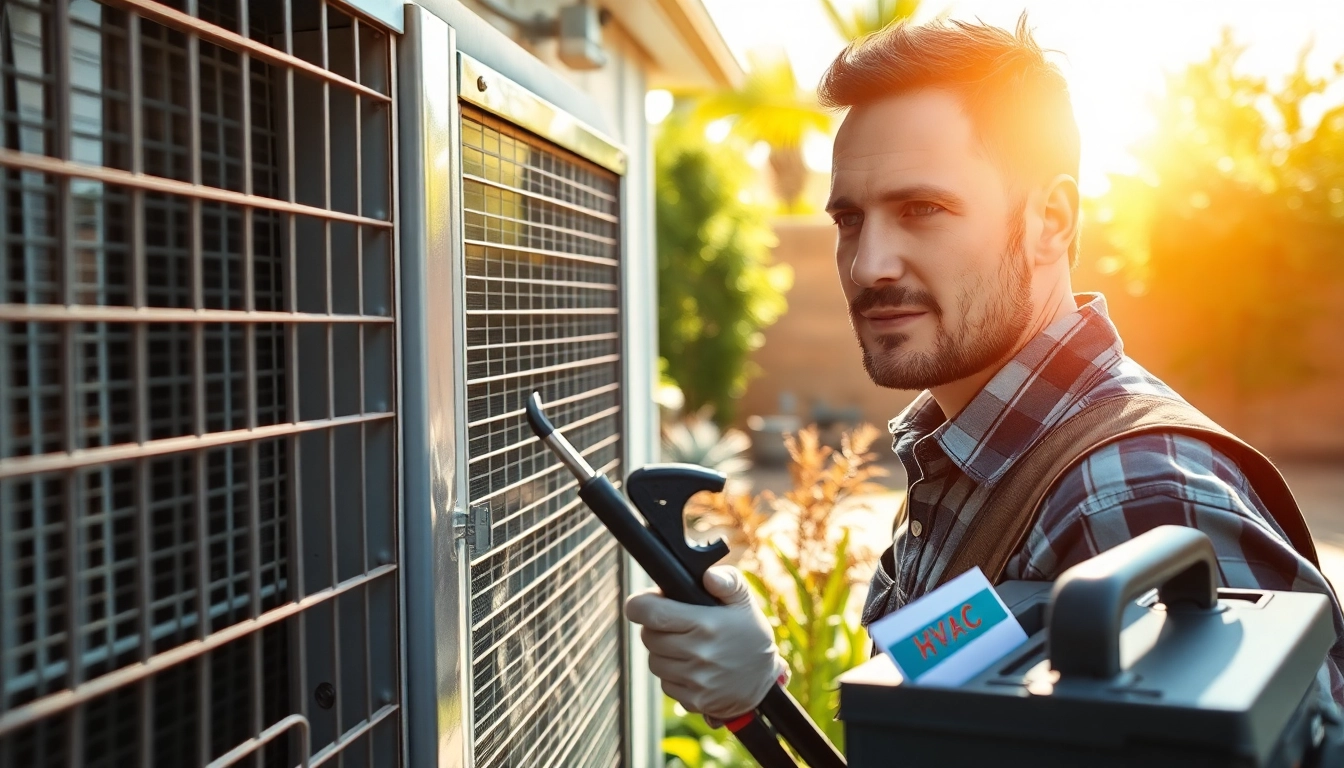Understanding AC Systems
Air conditioning systems are an essential part of modern comfort, especially in areas like Phoenix, where the heat can be overwhelming. Understanding how these systems operate, their components, and the various types available can help homeowners make informed decisions regarding their cooling needs. This knowledge is particularly beneficial when looking for ac repair phoenix az services.
Types of AC Units
In the realm of air conditioning, there are several types of units commonly used in residential settings:
- Central Air Conditioners: These systems use a network of ducts to circulate cool air throughout the home. They are typically more efficient for larger spaces.
- Window Air Conditioners: Ideal for single rooms, these self-contained units fit in a window and are relatively easy to install.
- Split Air Conditioners: These systems have an outdoor unit and an indoor unit and are known for their quiet operation and energy efficiency.
- Portable Air Conditioners: These units offer flexibility as they can be moved from room to room and do not require permanent installation.
- Hybrid Systems: Combining conventional heating with electric heating, these systems optimize efficiency and energy usage.
AC System Components
Every air conditioning unit consists of key components that work together to provide cooling:
- Compressor: The heart of an AC unit, compressing refrigerant and pumping it through the system.
- Evaporator Coil: Here, the refrigerant absorbs heat from the indoor air, creating a cooling effect.
- Condensing Unit: Located outside, it releases the absorbed heat into the outdoors, allowing the refrigerant to return to a liquid state.
- Expansion Valve: This component controls the flow of refrigerant into the evaporator coil, facilitating the refrigeration cycle.
- Air Handler: This unit circulates air through the system and can include a fan, filter, and ductwork.
How AC Works
At its core, air conditioning employs the principles of thermodynamics, using the refrigeration cycle to transfer heat from inside a building to the outside. The process can be summarized in several key steps:
- The compressor compresses the refrigerant gas, raising its temperature and pressure.
- The hot gas moves to the condenser, where it dissipates heat and condenses into a liquid.
- The liquid refrigerant then passes through the expansion valve, where it experiences a drop in pressure, cooling it down.
- As the cold refrigerant flows through the evaporator coil, it absorbs heat from the indoor air, cooling it.
- The cycle repeats as the refrigerant returns to the compressor, starting the process anew.
Common AC Problems in Phoenix
Residents in Phoenix often face unique challenges related to their air conditioning systems, primarily due to the harsh climate. Familiarizing yourself with common AC issues can help in early detection and prompt repairs.
Identifying Faulty Systems
AC systems can exhibit signs of malfunction as they age or wear down. Key indicators of a faulty system include:
- Inconsistent cooling across different rooms.
- Strange noises, such as grinding or squealing, during operation.
- Increased energy bills without any change in usage patterns.
- Strong odors emanating from the unit, which could indicate electrical or mold issues.
- Frequent tripping of circuit breakers or blown fuses.
Signs You Need AC Repair
Understanding when to call for AC repair is critical for maintaining system efficiency. Signs that professional service is needed include:
- Air blowing from vents is warm or not cool enough.
- Water pooling around the unit, indicating a refrigerant leak.
- Unusual sounds or smells, indicating potential mechanical or electrical issues.
- Increased humidity levels indoors, suggesting inadequate dehumidification by the system.
- Frequent cycling on and off without achieving the desired temperature.
Impact of Phoenix Climate on AC Performance
In Phoenix’s extreme heat, AC systems operate under considerable strain. High humidity and temperature can lead to greater energy consumption and increased wear on components. It is essential to ensure regular maintenance to keep AC units functioning optimally during peak usage months.
Choosing the Right AC Repair Service
Selecting an appropriate AC repair service is crucial for effective system management. The following guidelines can assist homeowners in making an informed choice.
What to Look For
When selecting an AC repair service, consider the following criteria:
- Licensure and Certification: Ensure that the technicians are certified and licensed to perform HVAC services.
- Experience: Look for companies with a solid history of working with various AC brands and models.
- Emergency Services: Inquire about the availability of 24/7 emergency services, especially during peak summer heat.
- Insurance Coverage: Verify that the company has liability insurance to protect against damages during repairs.
- Warranty on Repairs: A good service should offer warranties on parts and labor to ensure customer satisfaction.
Questions to Ask Potential Contractors
When interviewing potential contractors, asking the right questions can help gauge their expertise and reliability:
- What is your experience with my specific type of AC unit?
- Can you provide references from past customers?
- What are your service fees and pricing structure?
- How do you handle parts and warranties?
- What is your estimated timeframe for the repair?
Importance of Reviews and Recommendations
Reading customer reviews and seeking recommendations from friends or family can be invaluable. Reviews provide insight into the quality of service and customer satisfaction levels. Look for patterns in feedback, both positive and negative, to assess a contractor’s reliability and work quality.
Preventive Maintenance Tips for Homeowners
To maximize the lifespan and efficiency of an AC system, proactive maintenance is key. Here are some practical maintenance tips for homeowners.
Seasonal Maintenance Checklist
Adhering to a seasonal maintenance checklist can help keep your AC unit running smoothly:
- Replace or clean filters monthly to ensure efficient airflow.
- Inspect and clean the condenser unit regularly, removing debris and foliage.
- Ensure proper insulation around ducts to minimize energy loss.
- Check for any signs of rust or corrosion on electrical connections and metal parts.
- Schedule professional inspections at least once a year for comprehensive checks.
DIY Tips for Basic AC Care
Homeowners can perform several basic tasks to care for their Air Conditioning systems:
- Keep the outdoor unit clean and free of obstacles.
- Adjust the thermostat settings to optimize energy consumption.
- Seal any leaks around windows and doors to prevent cool air loss.
- Use energy-efficient settings where available to reduce strain on the system.
- Educate yourself on your AC model to understand its specific needs and maintenance requirements.
When to Call a Professional
Certain situations require professional expertise. Homeowners should call in the experts if they experience:
- Persistent issues despite basic maintenance efforts.
- Sudden drops in cooling capacity.
- Amidst major system installations or upgrades.
- Presence of unusual sounds, smells, or leaks.
- Inability to inspect and clean internal components safely.
Cost of AC Repair Services
A clear understanding of the costs associated with AC repair services in Phoenix can help homeowners budget effectively. Knowing the factors that influence these costs is essential for financial planning.
Factors Influencing Repair Costs
Several factors can influence the overall cost of AC repairs, including:
- Type of Repair: Minor tune-ups typically cost less than major repairs such as compressor replacements.
- Extent of Damage: The more complex the issue, the more it can cost to fix.
- Service Type: Emergency services may carry higher fees compared to standard hours.
- Parts and Labor: Prices can vary based on the availability and type of parts needed.
- System Age: Older units may incur higher repair costs due to the availability of parts and overall efficiency.
Understanding Estimates and Quotes
When obtaining estimates, pay attention to:
- Breakdown of parts and labor costs.
- Validity period of the quote.
- Inclusions or exclusions, such as warranties or follow-up inspections.
- Specific conditions that could affect the overall cost.
- Suggested seasonal maintenance to prevent further issues.
Budgeting for AC Repair Phoenix AZ
When budgeting for AC repair services in Phoenix, homeowners should consider setting aside funds for unexpected repairs. Understanding your air conditioning unit’s expected lifespan and common failure points can guide your budget planning. Regular maintenance can also help in reducing emergency repair costs by identifying issues early, ultimately saving you money and enhancing your comfort.



